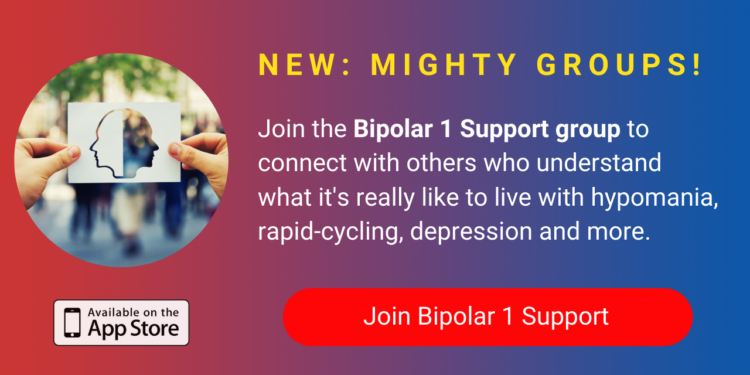What advice do you have for those newly diagnosed with bipolar disorder?
Whew. What a question. As someone who lives openly with bipolar disorder (type 1), this is one I’ve heard a few times. Bipolar disorder is complex, overwhelming, draining, sometimes painful and often all-consuming. So, where do you even start? Well, below are a few simple pieces of advice to help out!
• What is Bipolar disorder?
1. Block out all the noise.
There will be many people who have all sorts of opinions about mental illness, bipolar disorder, psychiatry, therapy and anything related to it. Examples of what you may hear (from family, friends, significant other, peers, colleagues, bosses, teachers, etc.):
- “Bipolar bisorder doesn’t exist.”
- “Psych meds are for crazy people.”
- “You don’t need a doctor. Just do yoga.”
- “You aren’t bipolar. You don’t act/look bipolar.”
- “Mental illnesses are fake (e.g., just attention-seeking behavior).”
Try not to take it personally. There are so, so many myths and misconceptions out there. It can take a lot of time to undo those stigmatizing manners of thinking about bipolar disorder and mental health conditions overall. Honestly, some people will never put in the effort. You have to learn which battles are worth fighting. If someone isn’t attempting to learn, maybe it’s not worth arguing with them.
2. Put your health first.
This is your brain. Your. Brain.
Let me tell you this: physical health vs mental health is really a misleading divide. Mental health impacts physical health; physical health impacts mental health. Think about it: Depression can drastically change your appetite, diet, energy level, ability to function, sleep and much more. All of these things have a massive toll on the body. In reverse, a “physical” condition can negatively impact one’s “mental” health, like when someone’s cancer diagnosis leads to depression. It is your brain. Take care of it!
3. Do not suddenly stop taking meds.
Yeah, I know. I’ve done it. I bet most of the people with bipolar disorder you talk to have stopped at some point (without doctor’s approval). So, I am here to tell you from personal experience: just don’t.
Why?
- It is dangerous. Sudden changes in the brain from stopping/altering meds without doctor oversight can lead to mania, depression, mixed episodes, suicidal/crisis episodes, etc. You can make things worse for yourself.
- If you feel great, guess what? That might be due to the meds. If you want to taper off, discuss that with your doctor. Otherwise, you risk becoming unstable. With each episode, you increase the odds of developing another episode… leading to a worse prognosis. It is in your best interest to do everything carefully, following medical advice.
- Side effects? I feel you. I’ve had:
- Incredibly irritated skin.
- Episodic periods of loss of control over my eyes (acute dystonic reaction; oculogyric crisis; eyes stuck locked upward) which was terrifying.
- Medicine so sedating that it was hard to walk.
So, I know that side effects can be unbearable. Discuss any concerns with your provider. This may be a dosage issue or an issue with the medication itself.
4. Don’t get discouraged if it takes a while to find the “right fit.”
The perfect medication dosage/brand/combo can be challenging to find. It takes a good relationship with a provider who is willing to really listen to the patient and ask the right questions.
If you do not feel as if you are treated right, you can seek a referral. A strong connection matters. Please try not to get discouraged if it takes a while (or much longer) to find the “right fit” regarding treatment/your provider/your therapist. It takes effort, time and sometimes luck. Finding the “right fit” is life-changing and even life-saving.
5. Plan, plan, plan.
Be prepared. Mood episodes happen. Crisis (full-blown mania, severe depression, etc) happen. Hospitalizations happen. Having a plan ahead of time can make it much smoother.
What steps do you want to take? Who do you want to contact? Provider/therapist can help create a plan.
6. Don’t wait until “rock bottom” to seek help.
You do not need to wait until “it gets worse.” I’ve heard this. I’ve felt it myself. You don’t need to reach a certain level of dysfunction or unbearable pain in order to justify seeking professional help.
You are worthy of treatment now. If bipolar disorder is interfering with life, it is a problem. A lot of people call mental health care a “luxury” but honestly it is a necessity. Connecting to a provider while stable is easier than during a crisis! It is a lot easier to do preventative efforts than try to get help when a mood episode is already in full force.
7. Please do not lose your identity or sense of self in a diagnostic label.
You are not bipolar disorder; you are a person who happens to have a mental health condition. This is simply a tool to help you on your journey to mental wellness and stability. This is not a label to fixate on or drag you down. Breathe. Even if you feel alone, you are far from it. There are millions of other people with bipolar disorder who have been in your shoes. It can be helpful to educate yourself on the condition and connect to others, finding a supportive mental health community (in-person or online such as on The Mighty).
Wishing you the best, from one bipolar warrior to another.
Photo by Alexandru Zdrobău on Unsplash


